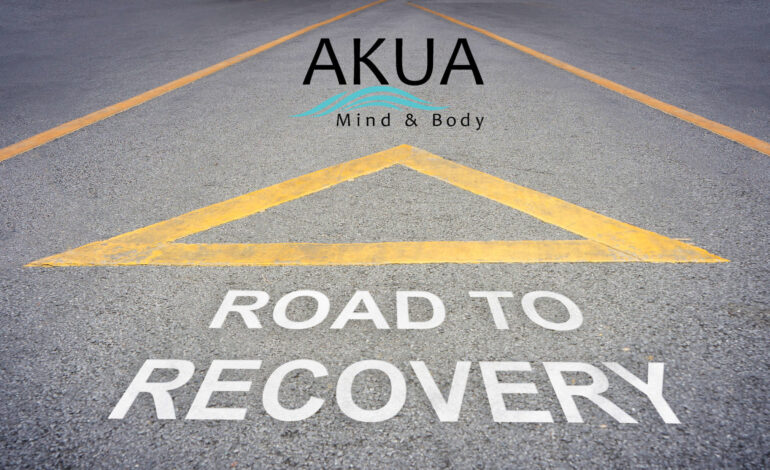September is National Recovery Month, initiated by the Substance Abuse and Mental Health Services Administration.
“Recovery Month promotes the societal benefits of prevention, treatment, and recovery for mental health and substance use disorders, celebrates people in recovery, applauds the contributions of treatment and service providers, and promotes the message that recovery in all its forms is possible”. -SAMSHA
Recovery Month spreads the positive message that behavioral health is essential to overall health, that prevention works, treatment is effective, and people can and do recover.
During September, AKUA Mind and Body will be promoting a series of written content that will highlight the perils of recovery to spread awareness about the successes, lessons, and hardships that come with recovery. This series will include the following:
Stages of Recovery
Common Roadblocks in Recovery
Therapist’s corner: Questions About Addiction Recovery
Things Not to Say to A Loved One In Recovery
The Importance of Connection in Recovery
“There are all kinds of addicts, I guess. We all have pain. And we all look for ways to make the pain go away.”
― Sherman Alexie, The Absolutely True Diary of a Part-Time Indian
Walking into your therapist’s office for the first time can be daunting. You are going to expose your darkest moments to this stranger in hopes that they will give you some insight on how to get your life back on track.
Will they judge you?
What will they think of your addiction?
Will therapy even help, or will the addiction become worse before it gets better?
Seeking treatment for your addiction is no easy step. It takes a lot of courage and patience to open up to a stranger about the current battles you are fighting. You may still be using it and may even be high when you walk into your first appointment. Yes, your therapist will know this. After all, addiction counselors have seen it all as this is their job, and nothing fazes them.
Your therapist is there to help you through this process, and therefore, they will most likely be honest with you, will not judge you, listen to you, and give you the tools you need to overcome your addiction. These things will take time, and the journey most likely will not be easy. Below are a few tidbits that your therapist may or may not tell you, but they want you to know.
Addiction is not a choice
Nobody woke up one morning and decided to become addicted to heroin, alcohol, Xanax, cocaine, or prescription opioids. Addiction is not a choice that happens overnight. Most addictions occur when individuals use alcohol or drugs to temporarily relieve emotional or physical pain or experiment with these substances. Unfortunately, it only takes a few times, a genetic predisposition, and a surge of dopamine for the brain and body to want more, leading the individual to continue using. The initial action to take a drink of alcohol or use prescribed pain medications is a conscious choice; however, individuals do not make this choice thinking they will later become addicted. It is important to remember that your addiction is a disease, and you will need therapy, a strong support team, and medications to overcome this disease.
There may be multiple reasons why an individual developed an addiction
Therapists usually discover underlying co-occurring disorders after spending some time with their client. Individuals struggling with addiction often deal with underlying trauma or co-occurring mental health disorders such as depression, anxiety, and bipolar disorder. Many individuals will turn to drugs or alcohol to mask their feelings associated with past traumas, grief, depression, or stress without knowing that an addiction is brewing. Individuals will not uncover these underlying triggers until they seek treatment for their addiction, and their therapist starts to unravel their dark pasts that were masked by drugs and alcohol.
Recovery is all about the long game
Although the client may look at therapy as a short term, day-to-day routine, therapists view recovery as a long game. What matters most is where you will be in a year from now. You may relapse or experience negative thoughts in the coming days, but therapy aims to help you develop coping skills and tools to be successful in your long game.
It is better to focus on the future instead of the past
It may be easy to add up your past mistakes and feel guilty for how you acted; however, your therapist is focused on your future, and you should be as well. It is also essential not to allow your friends and family to bring up your past mistakes. You are well aware of your past mistakes, and focusing on the past can only negatively affect your future. It is important to be mindful of your past, but you must focus on overcoming the hurdles that will lead you to a prosperous recovery.
AKUA Mind and Body treatment
AKUA Mind and Body is a full-service treatment program that offers a wide range of “east meets west” treatment modalities for many different populations struggling with mental health and substance use disorders. AKUA makes your recovery a priority. AKUA Mind and Body treats co-occurring disorders and works diligently with each client and their family to ensure that treatment is specifically tailored to their needs, and not just their disorder.
AKUA Mind and Body offers detoxification, intensive treatment programs, and outpatient treatment programs. AKUA Mind and Body uses a blend of holistic approaches combined with evidence-based treatment to help individuals who have been affected by substance use and mental health disorders to recognize their underlying triggers and develop healthy coping skills. Regardless of where you are in your recovery process, AKUA Mind and Body can help.



